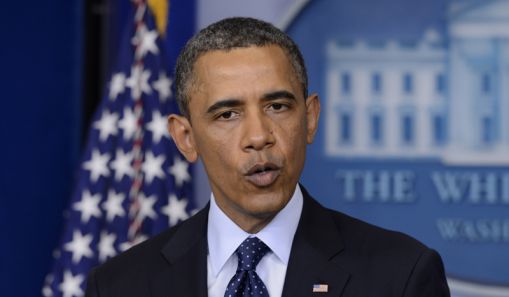
 On Thursday, the U.S. President, Barack Obama, is to deliver a speech at the National Defense University on a broad range of counterterrorism issues, it is seen as an attempt to demonstrate that the president is fully determined to fulfil the pledges he made in his State of the Union address earlier this year. At the same time, Obama's critics point to the fact that his counterterrorism speech will be delivered at a time when he faces snowballing criticism on domestic issues, with the word "impeachment" being uttered more and more often. In this context, the choice of topic is a curious one as the administration's counterterrorism policy has been questioned so many times both at home and abroad.
On Thursday, the U.S. President, Barack Obama, is to deliver a speech at the National Defense University on a broad range of counterterrorism issues, it is seen as an attempt to demonstrate that the president is fully determined to fulfil the pledges he made in his State of the Union address earlier this year. At the same time, Obama's critics point to the fact that his counterterrorism speech will be delivered at a time when he faces snowballing criticism on domestic issues, with the word "impeachment" being uttered more and more often. In this context, the choice of topic is a curious one as the administration's counterterrorism policy has been questioned so many times both at home and abroad.Read more: https://english.ruvr.ru/2013_05_23/Obamas-counterterrorism-speech-hardly-a-fortuitous-diversion-from-home-grown-problems/
Speaking on condition of anonymity in advance of the speech, a White House official said that Obama will "...discuss our broad counterterrorism policy, including our military, diplomatic, intelligence and legal efforts". Analysts have already pointed to two of the most most painful aspects, the use of drones and the fruitless efforts to close the notorious Guantanamo prison.
The legality of using drones has been questioned more often than not inside the U.S. and its illegality is now barely challenged anywhere else. A recent report, "Drones: Myths and Reality in Pakistan", published by the International Crisis Group on Tuesday, states a fact that had long been known to any unbiased observer: drone strikes are an ineffective solution to the problems they seek to address. While drone policy has yielded short-term successes, it fails to deter militant groups in the long-term. Not to mention that, strategically, drone strikes have damaged America's relationship with its one-time chief ally in Asia, Pakistan.
As for Guantanamo, the administration's inability to fulfil its promise to shut down the facility, made during Obama's 2008 election campaign, has recently been aggravated by a hunger strike among prisoners held there without trial.
In February, in his State of the Union address, President Obama pledged he would "continue to engage Congress to ensure not only that our targeting, detention and prosecution of terrorists remain consistent with our laws and system of checks and balances but that our efforts are even more transparent to the American people and to the world".
According to the White House source, the forthcoming speech at the National Defense University is meant to show the president's determination to make good on the pledge; "He will review the state of the threats we face, particularly as the al-Qaeda core has weakened but new dangers have emerged," said the anonymous official. "He will discuss the policy and legal framework under which we take action against terrorist threats, including the use of drones and, he will review our detention policy and efforts to close the detention facility at Guantanamo Bay".
Certainly, counterterrorism and the legal framework around it are issues of the utmost importance. The president's critics however have pointed out the timing of the speech, strangely coinciding with the growth of domestic problems facing Obama; scandals surrounding the tapping of Associated Press' telephones and the Internal Revenue Service targeting Tea Party and other conservative groups. The parallels between Obama and Richard Nixon are drawn more and more often and the word "impeachment" has now become a part of ongoing current discourse.
It is well known that a short victorious war is a solution to a wide variety of problems faced by rulers and so, by addressing counterterrorism issues Obama might be willing to repeat the trick once performed by George W. Bush. What worked in 2001 and again in 2004, might not however work this time. The subject of counterterrorism, along with the administration's failures in the field, may well prove a risky device for diverting the public's attention.
Boris Volkhonsky, senior research fellow, Russian Institute for Strategic Studies



_jpg/250px-ElbeDay1945_(NARA_ww2-121).jpg)







